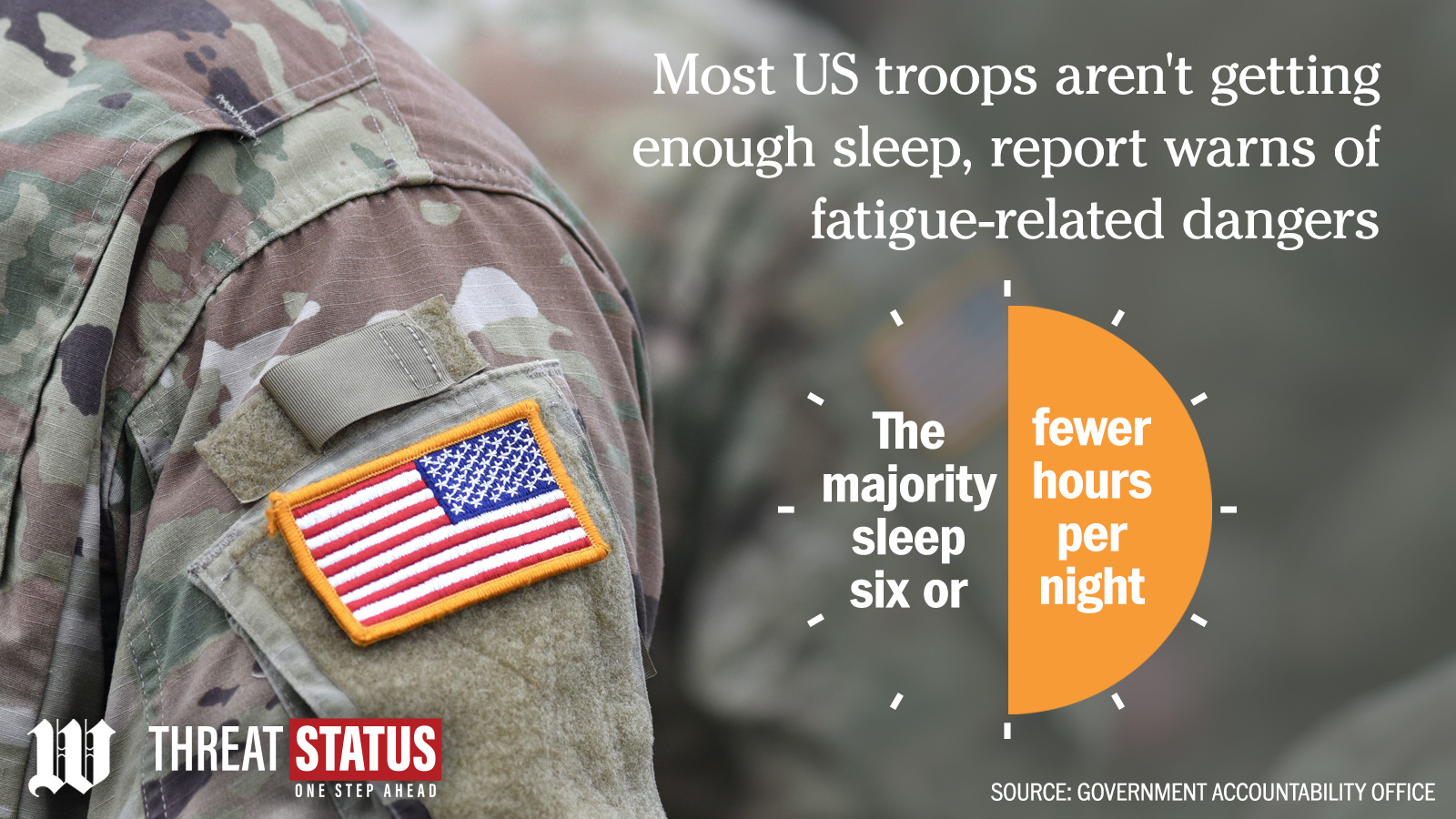A version of this article appeared in the daily Threat Status newsletter from The Washington Times. Click here to receive Threat Status delivered directly to your inbox each weekday.
Most U.S. troops need more sleep.
That’s the big-picture takeaway from a sweeping Government Accountability Office study that found a sizable majority of service members get six hours or less of sleep each night. The Defense Department recommends a minimum of seven hours.
The consequences could reach far beyond sluggishness or crankiness.
“When service members don’t get enough sleep, it can affect their performance. Fatigue has led to fatal accidents and hundreds of millions of dollars in damage to ships, vehicles, and aircraft,” says a part of the study, made public on Tuesday.
A remotely piloted aircraft operator told the GAO that they “almost collided with another aircraft due to mental fatigue,” and an aviation maintainer said sleep deprivation means a “greater possibility of mistakes.”
A motor vehicle operator gave perhaps the most eye-opening assessment.
“I could kill someone … because I’m not getting the right sleep,” the anonymous service member told the GAO.
The government watchdog examined Defense Department health data from 2005 through 2018, the most recent information available on sleep in the armed forces. It found that only one-third of troops said they sleep seven or eight hours per night. The majority reported they sleep six hours or less, and about one-third of service members said their sleep quality is “fairly bad or very bad.”

Indeed, the problem seems to be as much about the quality of sleep as the quantity. As one part of its study, the GAO asked a sample of military officers how much they sleep and how they would describe the quality of that sleep.
Sixty-seven percent said they get six to seven hours of sleep per night, and 7% said they get eight hours or more. Only half described their sleep as “good.” The other half described it as “poor.”
“We’re not just talking about a sailor or a pilot who has to shave a few hours off of sleep every now and then. We’re talking about service members who are getting six hours or less of sleep for months on end,” GAO investigator Diana Maurer told the agency’s GAO “Watchdog Report” podcast.
“When that happens, they reach a level of fatigue and sleep deprivation that approaches being intoxicated with alcohol,” she said. “That’s a very bad thing when you’re talking about people who are flying military aircraft, driving multi-ton vehicles and steering very large capital ships on the open sea.”
Health specialists say poor sleep quality is a leading contributor to overall sleep deficiency. It’s not necessarily about how much you sleep but whether you get the right kind of sleep and sleep at the right time of the day, among other factors.
“Sleep deficiency can interfere with work, school, driving and social functioning. You might have trouble learning, focusing and reacting. Also, you might find it hard to judge other people’s emotions and reactions. Sleep deficiency also can make you feel frustrated, cranky or worried in social situations,” according to the website of the National Heart, Lung and Blood Institute, an arm of the National Institutes of Health.
Sleep deprivation or deficiency could have serious consequences for the health and well-being of others, inside and outside the military. Earlier this year, two pilots of an Indonesian airline reportedly fell asleep and were unreachable for about 30 minutes in a plane with more than 150 people on board. The co-pilot told the pilot shortly after takeoff “that he did not have proper rest,” according to a report from the Indonesian National Transportation Safety Committee.
The plane veered off course but eventually landed safely. No one was hurt.
The incident could have ended in tragedy, and military services are well aware that lives depend on rest and alertness.
The Pentagon and military services have instituted a variety of studies and sleep-related programs, but the GAO said more should be done.
“GAO is making nine recommendations, including that DoD conducts an assessment of its fatigue-related oversight structure, assigns DoD leadership, and creates and maintains a list of all fatigue-related research projects, and that the military services assign fatigue-related leadership,” said the GAO report, adding that the Pentagon “generally concurred with the recommendations.”
Of course, military personnel often keep irregular hours, need to stay awake for long periods or have wildly unpredictable schedules. That’s where naps come in.
In 2020, the Army’s “Holistic Health and Fitness” manual stressed the benefits of a full eight hours of sleep each night. When sleeping through the night isn’t an option, the Army recommends naps whenever possible.
“When regular nighttime sleep is not possible due to mission requirements, soldiers can use short, infrequent naps to restore wakefulness and promote performance,” the Army manual says. “When routinely available sleep time is difficult to predict, soldiers might take the longest nap possible as frequently as time is available. During periods of restricted sleep (six hours of sleep or less per night), napping combined with appropriate doses of caffeine may help to sustain cognitive performance and alertness.”
Army leaders say officers should “encourage naps when appropriate,” particularly when soldiers are engaged in continuous operations that interrupt normal sleep patterns and often require service members to be awake for long periods. Those times of “restricted sleep,” which the Army defines as six hours or less per night, can be effectively mitigated with naps.
Ms. Maurer said, “The challenge that [the Defense Department] faces is translating that guidance — which, at the end of the day, [is] words on pieces of paper — into realities on the ground. And so a lot of our findings and recommendations were around that translation of policy into practice.”
• Ben Wolfgang can be reached at bwolfgang@washingtontimes.com.



Please read our comment policy before commenting.